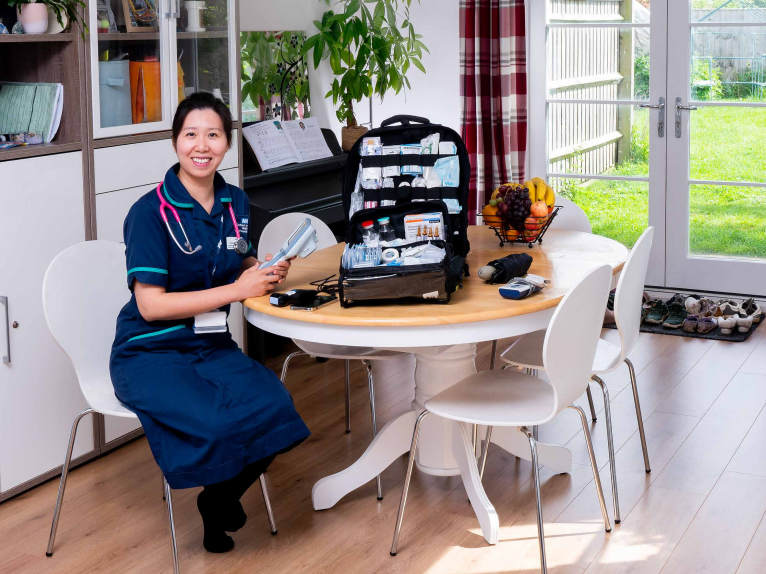Yuhan Zhang is an Advanced Nurse Practitioner in Oxford University Hospitals’ Ambulatory Outreach Team. She is also in the second year of a nursing doctorate at Oxford Brookes University, for which she is getting support from the NIHR Oxford Biomedical Research Centre (BRC).

Yuhan works in an area – ambulatory care in the community – where nurses are playing an increasingly important role and well placed to identify the gaps in our knowledge.
“We are a special kind of service and a special team of nurses because we are a bridge between the community and hospital,” she says.
Most of her team used to be ward-based nurses and now their patients are all based in the community. Their patients benefit from receiving hospital-level care in their own home, which can help them to improve more quickly. It does mean, though the team get to see them less than they would a patient on a hospital ward.
“Some of the patients live a long way away – how do you manage these patients? Remote monitoring. We do a lot of telephone reviews to assess whether they are coping at home. A lot of the decision-making is done by nurses after telephone reviews – and that is the research question I am looking at: nurses’ decision-making in remote review.
“With the digital tools we have, there are advantages – you can manage patients who are far away; it reduces the patient travel burden; if they’re feeling unwell, you can assess how you can support them at home. But there are also disadvantages – you can’t physically assess them face to face; you have to make a lot of decisions based on a phone call without actually seeing them. This is the risk: you don’t want to make decisions to bring them into hospital unnecessarily, but you don’t want to miss acutely ill patients by thinking it’s fine. This is what my research is seeking to address.”
As evidenced by the Oxford BRC’s own ‘Digital Health from Hospital to Home’ Theme, the concept of virtual wards and acute care in the community is growing, and Yuhan says that nurses have a vital role to play: “A lot of money will be invested in virtual wards, and a lot of them will be managed by nurses, who will need to make most of the decisions.”
When she was a ward nurse, Yuhan felt there was a “distinct barrier between clinical practice and research … for a clinical practice nurse, research is quite far away”. She also worked as a research nurse, where much of her work consisted of collecting data for clinical trials.
“I realised that I wanted to do more nursing research, rather than research for clinical trials, which is consultant-led, not focused on nursing. That led me to wanting to get that knowledge and that ability to conduct research that is orientated to nursing.”
She applied for a doctoral degree in nursing at Oxford Brookes University and started a small nurse-led project comparing a 24-hour infusion pump that delivered antibiotics for 24 hours, reducing the need to visit a patient’s home so often, with standard home care.
“We got this published in a nursing journal – and this triggered me into research. I wanted to do clinical research – actual real research in a real setting that benefits patients,” Yuhan explained.
Publishing the paper – and taking part in a writing retreat – brought Yuhan into contact with other more established nursing researchers who had already completed their PhDs and research degrees.
“Meeting them in person and having those conversations made me realise that we can contribute and have a say in shaping the medical area. For nurses, this is an area that needs to improve, and this is what drives me.”
There are four key pillars to an ANP role, one of which is research. “It means you are either able to translate that evidence base into clinical practice or generate new knowledge from your clinical practice.
“My ANP job description stipulates that I must complete some research elements. It supports me and my manager to allow me to do research-related activities. I think it would be valuable for more nurses to have the opportunity to undertake supported research as this would help improve patients care, as we work directly with them.”
This is where funding from the Oxford BRC has helped, allowing Yuhan to embark on her doctorate course while still carrying out her clinical duties.
“The BRC, helped by Helen Walthall [OUH’s Director of Nursing Research and Innovation], have been brilliant and I have got this funding. It allows me one day a week for a whole year to do the research I want to do. It is really important for me to be able to get some protected time to invest in my own study,” Yuhan says.
“This programme is designed for nurses with a clinical background who will have the academic skills to conduct independent nurse research.”